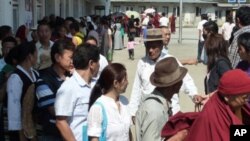Nepal police under the direction of Home Ministry of Nepal confiscated ballot boxes filled with thousands of ballots from several polling stations in Kathmandu, disrupting the preliminary election of Kalon Tripa-prime minister and Tibetan Parliament-in-Exile on Sunday.
Nearly 9,000 Tibetans have taken part in the election held in Boudha, Swayambhu and Jawalakhel, the three areas of the valley.
Thinley Gyatso, the regional Tibetan election commissioner in Nepal, informed VOA Tibetan Service that his office had been granted permission by the district commissioner in Kathmandu to conduct voting.
"The administration intervened in the so-called election because Nepal's foreign policy does not allow any activities against any friendly neighboring countries," CNN quoted Nepal's Home Ministry spokesman Jaya Mukunda Khanal.
Tibetans in exiles and activist group have condemned Nepal for seizing the ballots. Mary Beth Markey, President of the International Campaign for Tibet, said: "This is an unwarranted intrusion by the Nepalese police against Tibetans' exercise of their democratic right to a free and fair election. In respect of the democratic process, the ballot boxes must be returned to the Tibetan community in Nepal as a matter of urgency."
China recently announced it would give Nepal’s Ministry of Home Affairs US $1.47 million (10 million Yuan) every year to strengthen its security apparatus to curb “anti-China activities” on its soil.
He Yong, vice-premier and secretary at the secretariat of the 17th Central Committee of the Communist Party of China, had expressed satisfaction over Nepal’s ‘one China’ policy and the alertness adopted by Nepal over the Tibet issue during his September meeting with the Nepalese Prime Minister Madhav Kumar Nepal.
Prime Minister Nepal and Maoist leadership had reaffirmed Nepal’s 'one China' policy and said the government would not allow any outfit on its territory during their meeting.
Nepal is home to about 20,000 exiled Tibetans who began arriving in large numbers in 1959 after the Tibetan spiritual leader Dalai Lama fled Tibet following a failed uprising against the Chinese delegates.
However the number of the Tibetan refugees escaping from Nepal has decreased in the recent years following China’s growing influence in Nepal. Since 2008, Nepal has hardened its stance on the Tibetan refugees, a trend observed in the Himalayan country’s increasing ties with China.





